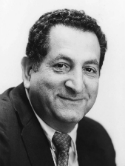You are not authorized to access this page.
Edatrexate in patients with soft tissue sarcoma: Activity in malignant fibrous histiocytoma Journal Article
| Authors: | Casper, E. S.; Christman, K. L.; Schwartz, G. K.; Johnson, B.; Brennan, M. F.; Bertino, J. R. |
| Article Title: | Edatrexate in patients with soft tissue sarcoma: Activity in malignant fibrous histiocytoma |
| Abstract: | Background. Chemotherapy has had little impact on the natural history of soft tissue sarcoma, and often is associated with serious toxicity. Edatrexate, an investigational antifolate, is active in patients with lung cancer, and has cytotoxic activity in human sarcoma cell lines. Methods. Edatrexate was administered to 36 patients with measurable, advanced soft tissue sarcoma who had not previously received chemotherapy. The drug was given weekly for 5 weeks, then every other week. The initial dose, 80 mg/m2, was escalated by 10 mg/m2 every 2 weeks in the absence of toxicity. Eleven patients had leiomyosarcoma, 7 had malignant fibrous histiocytoma (MFH), and 5 had liposarcoma; the remainder of cell types included hemangiopericytoma (4), angiosarcoma (3), synovial (2), spindle cell (2), extraosseous chondrosarcoma (1), and fibrosarcoma (1). Results. Thirty‐five patients are evaluable. Partial response (PR) was seen in five of the seven patients with MFH; no other major responses occurred. Overall, the response frequency was 14% (two‐sided 95% confidence interval, 3% to 26%). Median duration of PR was 6 months (range, 4–18 months). One patient had a minor tumor regression, and six had stable disease. Myelosuppression was generally mild; only three patients had grade 3 hematologic toxicity. Modification of dose or schedule was required in 50% of patients for mucositis. Fatigue was a common toxicity, seen in 66% of patients, but was tolerable in the majority. A rash was seen in 46% of patients; one patient had hepatic toxicity. Conclusions. Overall, the activity of edatrexate in this study, dominated by patients with either visceral or vascular sarcoma, was poor. However, the responses observed in patients with metastatic MFH suggests that further evaluation of edatrexate in patients with soft tissue sarcoma is warranted. Copyright © 1993 American Cancer Society |
| Keywords: | adult; clinical article; treatment outcome; aged; fatigue; antineoplastic agents; drug eruption; phase 2 clinical trial; bone marrow suppression; mucosa inflammation; tumor regression; sarcoma; soft tissue; drug response; dermatofibroma; leiomyosarcoma; malignant fibrous histiocytoma; phase ii; aminopterin; soft tissue neoplasms; liposarcoma; intravenous drug administration; antifolate; middle age; neoplasms, vascular tissue; edatrexate; human; male; female; priority journal; article; support, u.s. gov't, p.h.s. |
| Journal Title: | Cancer |
| Volume: | 72 |
| Issue: | 3 |
| ISSN: | 0008-543X |
| Publisher: | Wiley Blackwell |
| Date Published: | 1993-08-01 |
| Start Page: | 766 |
| End Page: | 770 |
| Language: | English |
| DOI: | 10.1002/1097-0142(19930801)72:3<766::Aid-cncr2820720321>3.0.Co;2-z |
| PUBMED: | 8392904 |
| PROVIDER: | scopus |
| DOI/URL: | |
| Notes: | Source: Scopus |
Altmetric
Citation Impact
BMJ Impact Analytics
Related MSK Work






